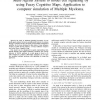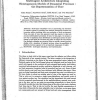430 search results - page 1 / 86 » The Importance of Representing Cognitive Processes in Multi-... |
ICANN
2001
Springer
13 years 9 months ago
2001
Springer
We distinguish between two main types of model: predictive and explanatory. It is argued (in the absence of models that predict on unseen data) that in order for a model to increas...
BIBE
2009
IEEE
13 years 11 months ago
2009
IEEE
—In order to simulate biological processes, we use multi-agents system. However, modelling cell behavior in systems biology is complex and may be based on intracellular biochemic...
ECAI
1994
Springer
13 years 8 months ago
1994
Springer
1 A hybrid (symbolic/connectionist) cognitive architecture, DUAL, is proposed. It is a multi-agent system which consist of a large number of non-cognitive, relatively simple agents...
MABS
1998
Springer
13 years 9 months ago
1998
Springer
Multi-agent simulations aim at representing the dynamics of complex systems as resulting from multiple interactions between autonomous entities including their own perception of lo...
CMOT
1998
13 years 4 months ago
1998
A programming language which is optimized for modelling multi-agent interaction within articulated social structures such as organizations is described with several examples of it...


